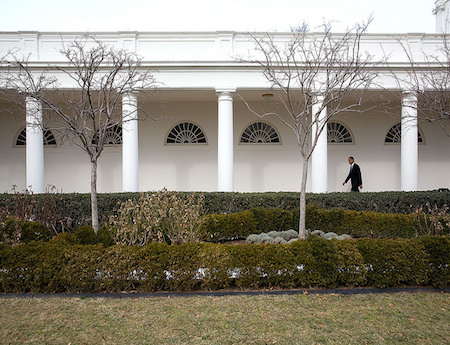White House Charts AI Future

The smarter way to stay on top of broadcasting and cable industry. Sign up below
You are now subscribed
Your newsletter sign-up was successful
The White House has issued a report on and recommendations for the development of artificial intelligence (AI).
The technology can help TVs or computers identify what viewers are watching and help target ads to them.
The White House even made that point in the intro to the report, citing Google CEO Sundar Pichai, who said that "Machine learning [a subfield of AI] is a core, transformative way by which we’re rethinking how we’re doing everything," adding: "We are thoughtfully applying it across all our products, be it search, ads, YouTube, or Play. And we’re in early days, but you will see us—in a systematic way— apply machine learning in all these areas.”
The report cites as one of the AI milestones "IBM’s question-answering computer Watson’s victory in the TV game show Jeopardy!"
"Intelligent computer systems have long been the subject of science fiction. Now, we are entering an era in which AI is having broad and deep impacts on our daily lives," said the administration in releasing the report, as well as a strategic plan for research and development.
"Preparing for the Future of Artificial Intelligence" was released a day before the President is scheduled to speak at the White House Frontiers Conference in Pittsburgh.
The report, which included public input, also talks about boosting diversity in the AI workforce and the important role of schools and universities.
The smarter way to stay on top of broadcasting and cable industry. Sign up below
The White House also suggests the need of another report. "The report recommends that the White House convene a study on automation and the economy, resulting in a follow-on public report that will be released by the end of this year," blogged Ed Felten, deputy chief technology officer and Terah Lyons, policy advisor to the U.S. chief technology officer.
Among the possible uses of AI are to help private and government broadband networks better react to or anticipate cybersecurity threats, said the report, which was produced by the Executive Office of the President's National Science and Technology Council (NSTC).
An AI-driven Internet of Things also has implications for drones, self-driving cars and virtually everything in between. To that end, "given the potential impacts of AI, society would benefit from accurate and timely methods for monitoring and forecasting AI developments," said the White House.
In 2015, the U.S. government’s investment in unclassified AI-related R&D was about $1.1 billion, expected to grow to $1.2 billion this year—no word on the classified applications. The administration says that while the private sector will drive progress in AI, a strong case can be made for doubling or tripling that government investment or at least targeted increases at that level in areas of high economic or strategic value.
The main R&D priorities, according to the strategic plan, are: make long-term investments in AI research; "Develop Effective Methods for Human-AI Collaboration; Understand and Address the Ethical, Legal, and Societal Implications of AI Ensure the Safety and Security of AI Systems; Develop Shared Public Datasets and Environments for AI Training and Testing; Measure and Evaluate AI Technologies through Standards and Benchmarks"; and "Better Understand the National AI R&D Workforce Needs."
Contributing editor John Eggerton has been an editor and/or writer on media regulation, legislation and policy for over four decades, including covering the FCC, FTC, Congress, the major media trade associations, and the federal courts. In addition to Multichannel News and Broadcasting + Cable, his work has appeared in Radio World, TV Technology, TV Fax, This Week in Consumer Electronics, Variety and the Encyclopedia Britannica.

